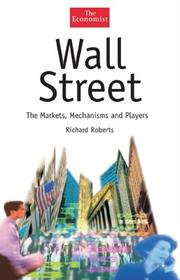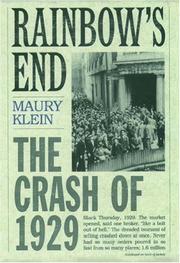| Listing 1 - 5 of 5 |
Sort by
|

ISBN: 1861974647 9786611031633 1281031631 1847650252 Year: 2003 Publisher: London : Profile Books,
Abstract | Keywords | Export | Availability | Bookmark
 Loading...
Loading...Choose an application
- Reference Manager
- EndNote
- RefWorks (Direct export to RefWorks)
A guide to Wall Street, the world's leading financial centre.
336.76 --- 336.76 Beurswezen. Geldmarkt. Valutamarkt. Binnenlandse geldmarkt. Valutamarkt --- Beurswezen. Geldmarkt. Valutamarkt. Binnenlandse geldmarkt. Valutamarkt --- -Speculation --- -332.60973 --- Ja1.iusa --- Bucket-shops --- New York Stock Exchange. --- NYSE --- Bourse de New York --- Nyū Yōku Kabushiki Torihikijo --- New York Stock and Exchange Board --- N.Y.S.E. --- N.Y. Stock Exchange --- Nʹi︠u︡-Iorkskai︠a︡ fondovai︠a︡ birzha --- Нью-Иоркская фондовая биржа --- Financial District (New York, N.Y.) --- Financial services industry --- New York (N.Y.). --- New York (City). --- NYSE Amex --- Wall Street (New York, N.Y.)

ISBN: 0195135164 0195158016 1602567034 0198030908 1280655380 0195302354 9780195158014 9780198030904 Year: 2001 Volume: *1 Publisher: Oxford New York [etc.] Oxford University Press
Abstract | Keywords | Export | Availability | Bookmark
 Loading...
Loading...Choose an application
- Reference Manager
- EndNote
- RefWorks (Direct export to RefWorks)
The Crash of '29 is one of the key moments in American, and indeed world history. This narrative historian addresses its effects on both business and society, and recreates the coming together of economic forces culminating in this disaster.
History of North America --- anno 1920-1929 --- United States --- Beurskrach, 1929 --- Black Tuesday, 1929 --- Great Crash, 1929 --- Krach boursier, 1929 --- Stock Market Crash, 1929 --- Wall Street Crash, 1929 --- Depressions --- Stock Market Crash, 1929. --- US / United States of America - USA - Verenigde Staten - Etats Unis --- 331.162.1 --- #KVHA:Geschiedenis; Verenigde Staten --- #KVHA:Economie; Verenigde Staten --- #KVHA:Politiek; Verenigde Staten --- #KVHA:American Studies --- Geschiedenis van de financiële markten. --- New York Stock Exchange --- History. --- Economic conditions --- E-books --- Depressions. --- Economic Theory --- Business & Economics --- Crash, Stock Market, 1929 --- Stock Exchange Crash, 1929 --- Financial crises --- Great Depression, 1929 --- 1929 --- 1918-1945 --- History --- NYSE --- Bourse de New York --- New York (N.Y.). --- Nyū Yōku Kabushiki Torihikijo --- New York (City). --- New York Stock and Exchange Board --- N.Y.S.E. --- N.Y. Stock Exchange --- Nʹi︠u︡-Iorkskai︠a︡ fondovai︠a︡ birzha --- Нью-Иоркская фондовая биржа --- NYSE Amex --- Geschiedenis van de financiële markten --- United States of America
Book
ISBN: 0674050657 0674061217 9780674061217 9780674050655 Year: 2011 Publisher: Cambridge, MA
Abstract | Keywords | Export | Availability | Bookmark
 Loading...
Loading...Choose an application
- Reference Manager
- EndNote
- RefWorks (Direct export to RefWorks)
The financial crisis that began in 2008 has made Americans keenly aware of the enormous impact Wall Street has on the economic well-being of the nation and its citizenry. How did financial markets and institutions-commonly perceived as marginal and elitist at the beginning of the twentieth century-come to be seen as the bedrock of American capitalism? How did stock investment-once considered disreputable and dangerous-first become a mass practice?Julia Ott tells the story of how, between the rise of giant industrial corporations and the Crash of 1929, the federal government, corporations, and financial institutions campaigned to universalize investment, with the goal of providing individual investors with a stake in the economy and the nation. As these distributors of stocks and bonds established a broad, national market for financial securities, they debated the distribution of economic power, the proper role of government, and the meaning of citizenship under modern capitalism.By 1929, the incidence of stock ownership had risen to engulf one quarter of American households in the looming financial disaster. Accordingly, the federal government assumed responsibility for protecting citizen-investors by regulating the financial securities markets. By recovering the forgotten history of this initial phase of mass investment and the issues surrounding it, Ott enriches and enlightens contemporary debates over economic reform.
Securities industry --- Securities --- Blue sky laws --- Capitalization (Finance) --- Investment securities --- Portfolio --- Scrip --- Securities law --- Underwriting --- Investments --- Investment banking --- Financial services industry --- History --- Law and legislation --- New York Stock Exchange --- NYSE --- Bourse de New York --- New York (N.Y.). --- Nyū Yōku Kabushiki Torihikijo --- New York (City). --- New York Stock and Exchange Board --- N.Y.S.E. --- N.Y. Stock Exchange --- Nʹi︠u︡-Iorkskai︠a︡ fondovai︠a︡ birzha --- Нью-Иоркская фондовая биржа --- NYSE Amex --- History. --- Wall Street (New York, N.Y.) --- Financial District (New York, N.Y.) --- E-books --- 331.162.1 --- 333.613 --- 339.112.2 --- US / United States of America - USA - Verenigde Staten - Etats Unis --- Geschiedenis van de financiële markten --- Activiteiten van de nationale en internationale markten. Beursnoteringen van aandelen en obligaties --- Eigendom van roerende goederen
Book
ISBN: 9780691133539 0691133530 9786612964565 1400836972 1282964569 9781400836970 Year: 2011 Publisher: Princeton, N.J. Princeton University Press
Abstract | Keywords | Export | Availability | Bookmark
 Loading...
Loading...Choose an application
- Reference Manager
- EndNote
- RefWorks (Direct export to RefWorks)
The efficiency, safety, and soundness of financial markets depend on the operation of core infrastructure--exchanges, central counter-parties, and central securities depositories. How these institutions are governed critically affects their performance. Yet, despite their importance, there is little certainty, still less a global consensus, about their governance. Running the World's Markets examines how markets are, and should be, run. Utilizing a wide variety of arguments and examples from throughout the world, Ruben Lee identifies and evaluates the similarities and differences between exchanges, central counter-parties, and central securities depositories. Drawing on knowledge and experience from various disciplines, including business, economics, finance, law, politics, and regulation, Lee employs a range of methodologies to tackle different goals. Conceptual analysis is used to examine theoretical issues, survey evidence to describe key aspects of how market infrastructure institutions are governed and regulated globally, and case studies to detail the particular situations and decisions at specific institutions. The combination of these approaches provides a unique and rich foundation for evaluating the complex issues raised. Lee analyzes efficient forms of governance, how regulatory powers should be allocated, and whether regulatory intervention in governance is desirable. He presents guidelines for identifying the optimal governance model for any market infrastructure institution within the context of its specific environment. Running the World's Markets provides a definitive and peerless reference for how to govern and regulate financial markets.
International finance --- Finance --- Stock exchanges --- Management. --- AA / International- internationaal --- 333.600 --- Financiële markten. Kapitaalmarkten (algemeenheden). --- Bulls and bears --- Commercial corners --- Corners, Commercial --- Equity markets --- Exchanges, Securities --- Exchanges, Stock --- Securities exchanges --- Stock-exchange --- Stock markets --- Capital market --- Efficient market theory --- Speculation --- Funding --- Funds --- Economics --- Currency question --- Management --- Financiële markten. Kapitaalmarkten (algemeenheden) --- E-books --- Financial management. --- Canadian Depository for Securities. --- Clearstream International. --- Depository Trust and Clearing Corporation. --- Deutsche Brse. --- Euroclear. --- European Central Counterparty Limited. --- Financial Sector Assessment Program. --- Hong Kong Exchanges and Clearing. --- International Council of Securities Associations. --- International Organization of Securities Commissions. --- LCH.Clearnet. --- London International Financial Futures and Options Exchange. --- London Stock Exchange. --- Murakami Fund. --- NASDAQ. --- New York Stock Exchange. --- Osaka Securities Exchange. --- World Federation of Exchanges. --- board composition. --- cash equity markets. --- central counter-parties. --- central counterparties. --- central securities depositories. --- central securities. --- clearing institutions. --- exchanges. --- fair markets. --- financial markets. --- financial regulation. --- governance model. --- governance. --- harmoniztion. --- industry structure. --- infrastructure institutions. --- infrastructure. --- investor protection. --- jurisdiction. --- jurisdictions. --- market infrastructure institutions. --- market infrastructure. --- market power. --- ownership structure. --- profit mandate. --- regulatory authority. --- regulatory intervention. --- regulatory power allocation. --- regulatory powers. --- securities markets. --- settlement entities. --- standardization. --- systemic risk reduction.
Book
ISBN: 1400889081 0691171661 Year: 2017 Publisher: Princeton, NJ : Princeton University Press,
Abstract | Keywords | Export | Availability | Bookmark
 Loading...
Loading...Choose an application
- Reference Manager
- EndNote
- RefWorks (Direct export to RefWorks)
Money is nothing more than what is commonly exchanged for goods or services, so why has understanding it become so complicated? In Money, renowned economist John Kenneth Galbraith cuts through the confusions surrounding the subject to present a compelling and accessible account of a topic that affects us all. He tells the fascinating story of money, the key factors that shaped its development, and the lessons that can be learned from its history. He describes the creation and evolution of monetary systems and explains how finance, credit, and banks work in the global economy. Galbraith also shows that, when it comes to money, nothing is truly new-least of all inflation and fraud.
Economic history. --- Money --- History. --- Alexander Hamilton. --- American Revolution. --- American colonies. --- Andrew Jackson. --- Austria. --- Bank of England. --- Bank of the United States. --- Bretton Woods agreements. --- Britain. --- Christopher Columbus. --- David Ricardo. --- Employment Act (1946). --- Europe. --- Federal Reserve Act (1913). --- Federal Reserve System. --- France. --- Franklin D. Roosevelt. --- French Revolution. --- Germany. --- Great Depression. --- Gross National Product (GNP). --- Irving Fisher. --- Italy. --- John Law. --- John Maynard Keynes. --- Massachusetts Bay Colony. --- National Bank Act (1863). --- National Monetary Commission. --- New Economics. --- New York Stock Exchange. --- Nicholas Biddle. --- Richard M. Nixon. --- Robert Morris. --- Salmon P. Chase. --- Say's Law. --- Second Bank of the United States. --- The General Theory of Employment Interest and Money. --- Treasury notes. --- United States. --- Winston Churchill. --- World War I. --- World War II. --- anti-inflation policies. --- assignats. --- bank deposits. --- bank failures. --- bank notes. --- bank paper. --- bank rate. --- bank reserves. --- banks. --- budget. --- canals. --- central banks. --- coins. --- commerce. --- consumer expenditures. --- copper. --- credit. --- currency stabilization. --- deflation. --- demand. --- dual monetary system. --- economic policy. --- economy. --- employment. --- euphoria. --- finance. --- fiscal policy. --- fraud. --- free banking. --- global economy. --- gold standard. --- gold. --- government paper. --- greenbacks. --- income. --- inflation. --- investment. --- loans. --- market power. --- monetary policy. --- monetary system. --- monetary systems. --- money supply. --- money. --- national banks. --- national income. --- national product. --- notes. --- open-market operations. --- panics. --- paper money. --- politics. --- precious metals. --- prices. --- railroads. --- recessions. --- securities. --- silver. --- speculation. --- stock market crash. --- stock market. --- stocks. --- taxation. --- underemployment. --- unemployment. --- wages. --- whole prices.
| Listing 1 - 5 of 5 |
Sort by
|

 Search
Search Feedback
Feedback About UniCat
About UniCat  Help
Help News
News